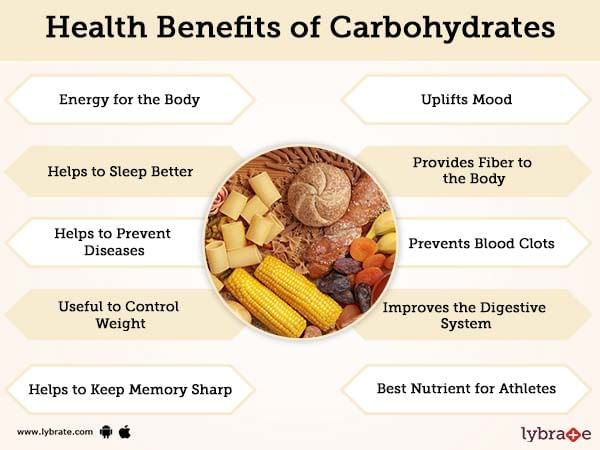Discover the drawbacks of a high-carb diet and how it can impact your health. From weight gain and blood sugar control to heart health and hormonal imbalances, this article covers it all. Make informed dietary choices to prioritize your overall well-being.
In the world of nutrition, the high-carb diet has gained substantial attention for its potential benefits. However, amidst all the hype, it is crucial to explore the drawbacks that come hand in hand with this eating approach. This article sheds light on the disadvantages of a high-carb diet and emphasizes the impact it may have on your overall health. By analyzing the potential consequences of excessive carbohydrate consumption, you will gain a deeper understanding of the potential pitfalls that can arise from following this popular dietary trend. From potential weight gain and difficulty in managing blood sugar levels to increased risk of chronic diseases, it is essential to be well-informed before making any dietary choices.
The Drawbacks of a High-Carb Diet
1. Weight Gain and Obesity
A high-carb diet can contribute to weight gain and obesity through various mechanisms.
1.1 Insulin and Fat Storage
When you consume high amounts of carbohydrates, especially refined carbohydrates, your body releases insulin to help process the glucose from these carbohydrates. Insulin plays a key role in storing excess glucose as triglycerides in fat cells, leading to weight gain and potentially obesity over time.
1.2 Increased Calorie Intake
Many high-carb foods, such as sugary drinks, pastries, and processed snacks, tend to be calorie-dense and low in nutrients. Consuming these foods can lead to an increased calorie intake without providing essential vitamins, minerals, and other beneficial compounds that your body needs. This imbalance in calorie intake can contribute to weight gain.
1.3 Impact on Hunger Hormones
High-carb diets can also impact hunger hormones, such as ghrelin and leptin, which regulate appetite and satiety. Consuming large amounts of carbohydrates can lead to rapid spikes and drops in blood sugar levels, causing hunger cravings and a higher likelihood of overeating.
2. Blood Sugar Control and Diabetes
A high-carb diet can have negative effects on blood sugar control and increase the risk of developing type 2 diabetes.
2.1 Spike in Blood Sugar Levels
Carbohydrates are broken down into glucose, which enters the bloodstream and raises blood sugar levels. When you consume a high-carb meal, your blood sugar levels can spike rapidly, leading to a surge in insulin production. Over time, this constant fluctuation in blood sugar levels can impair your body’s ability to regulate blood glucose properly.
2.2 Insulin Resistance
Consistently high insulin levels due to a high-carb diet can lead to a condition called insulin resistance. In insulin resistance, your body’s cells become less responsive to insulin, requiring higher levels of insulin to process glucose effectively. This condition can eventually progress to type 2 diabetes if left unmanaged.
2.3 Type 2 Diabetes Risk
Multiple studies have shown a strong association between high-carb diets and an increased risk of developing type 2 diabetes. The excess consumption of refined carbohydrates, such as white bread, sugary drinks, and desserts, can significantly raise the risk of developing this metabolic disorder.

3. Energy Levels and Fatigue
A high-carb diet can also impact your energy levels and lead to feelings of fatigue and exhaustion.
3.1 Blood Sugar Roller Coaster
Consuming a diet high in carbohydrates can result in a blood sugar roller coaster. When you eat high-carb meals, your blood sugar levels rise quickly, providing a surge of energy. However, this energy boost is often short-lived, as blood sugar levels quickly plummet, leading to feelings of fatigue and lethargy.
3.2 Lack of Sustained Energy
A high-carb diet, particularly one that relies heavily on refined carbohydrates and sugar, can fail to provide sustained energy. These high-glycemic foods can cause rapid spikes and drops in blood sugar levels, leaving you feeling drained and low in energy throughout the day.
3.3 Nutrient Deficiencies
While carbohydrates are an essential energy source, relying too heavily on them can lead to nutrient deficiencies. High-carb diets often neglect other vital nutrients found in protein, healthy fats, and a variety of fruits and vegetables. These nutrient deficiencies can contribute to feelings of fatigue and decreased energy levels.
4. Increased Inflammation
A high-carb diet has been associated with increased inflammation in the body, which can have negative implications for overall health.
4.1 Promotion of Pro-inflammatory Responses
High-carb diets, especially those rich in refined carbohydrates and added sugars, can trigger pro-inflammatory responses in the body. Chronic inflammation is linked to numerous health conditions, including heart disease, diabetes, and certain types of cancer.
4.2 Association with Chronic Diseases
Inflammation plays a role in the development and progression of chronic diseases, and a high-carb diet can contribute to this process. The constant consumption of refined carbohydrates and sugars can increase the production of inflammatory molecules, leading to a higher risk of developing chronic diseases.
4.3 Negative Impact on Gut Health
A high-carb diet, particularly one lacking in fiber-rich foods, can negatively impact gut health. Fiber acts as a prebiotic, providing nourishment for beneficial gut bacteria. Without sufficient fiber, these beneficial bacteria may decrease, leading to an imbalance in the gut microbiota, which can contribute to inflammation and digestive issues.

5. Impact on Heart Health
Consuming a high-carb diet can have detrimental effects on heart health.
5.1 Elevated Triglyceride Levels
High-carb diets, especially those rich in refined carbohydrates and sugars, can raise levels of triglycerides in the blood. Elevated triglyceride levels are a risk factor for cardiovascular disease, including heart attacks and strokes.
5.2 Reduced HDL Cholesterol
A high-carb diet can lower levels of high-density lipoprotein (HDL) cholesterol, commonly known as “good” cholesterol. HDL cholesterol helps remove low-density lipoprotein (LDL) cholesterol, the “bad” cholesterol, from the bloodstream. Lower levels of HDL cholesterol can increase the risk of heart disease.
5.3 Increased Risk of Heart Disease
The combination of elevated triglycerides and reduced HDL cholesterol levels, along with other risk factors associated with high-carb diets, such as inflammation and insulin resistance, can significantly increase the risk of developing heart diseases like atherosclerosis, heart attacks, and strokes.
6. Dental Problems
A high-carb diet can negatively impact your oral health, leading to various dental problems.
6.1 Increased Risk of Tooth Decay
Frequent consumption of high-carb foods, especially those containing sugars and starches, can increase the risk of tooth decay. The bacteria present in your mouth feed on the sugars from these foods, producing acids that erode enamel and lead to cavities.
6.2 Promotes Acidity in the Mouth
High-carb diets can result in a more acidic oral environment due to the breakdown of carbohydrates into sugars. This acidity promotes the growth of acid-loving bacteria, which can damage tooth enamel and contribute to tooth decay.
6.3 Gum Disease Risk
Gum disease, also known as periodontal disease, is more prevalent in individuals with a high-carb diet. Carbohydrates, especially refined carbohydrates, can be sticky and cling to teeth, providing a breeding ground for bacteria. The buildup of plaque and bacteria can lead to gum inflammation, infection, and ultimately, gum disease if left untreated.

7. Hormonal Imbalances
A high-carb diet can disrupt hormonal balance in various ways, impacting overall health.
7.1 Negative Impact on Insulin
A high-carb diet can lead to insulin resistance, as mentioned earlier, which disrupts the normal functioning of insulin in regulating blood sugar levels. When insulin levels are constantly elevated, it can have far-reaching effects on other hormones in the body.
7.2 Influence on Other Hormones
Insulin resistance caused by a high-carb diet can interfere with the regulation of other hormones, such as estrogen, testosterone, and thyroid hormones. Hormonal imbalances can contribute to various health issues, including reproductive problems, mood swings, and difficulties with weight management.
7.3 May Disrupt Menstrual Cycles
For women, a high-carb diet may disrupt menstrual cycles and lead to irregular or painful periods. Fluctuations in blood sugar levels and hormonal imbalances can impact the regularity and severity of menstruation.
8. Long-Term Brain Health
A high-carb diet, particularly one lacking essential nutrients, can have detrimental effects on long-term brain health.
8.1 Association with Cognitive Decline
Studies have suggested a link between high-carb diets, particularly those with a high glycemic load, and an increased risk of cognitive decline. Elevated blood sugar levels and insulin resistance can harm brain cells and impair cognitive function.
8.2 Increased Risk of Dementia
Prolonged consumption of a high-carb diet, especially one deficient in essential nutrients and antioxidants, has been associated with an increased risk of developing dementia, including Alzheimer’s disease. The underlying mechanisms include oxidative stress, inflammation, and impaired glucose metabolism in the brain.
8.3 Impaired Memory and Learning
A diet high in refined carbohydrates and sugars can impair memory and learning abilities. Rapid blood sugar spikes and drops can lead to fluctuations in brain glucose levels, hindering cognitive functioning and affecting memory recall and information processing.

9. Lack of Essential Nutrients
A high-carb diet may lack essential nutrients necessary for optimal health and well-being.
9.1 Insufficient Intake of Vitamins
High-carb diets, particularly those heavily reliant on refined carbohydrates, can lack essential vitamins, particularly B vitamins, vitamin D, and certain antioxidants found in fruits, vegetables, and whole grains. These vitamins play numerous crucial roles in the body, including energy production, immune function, and disease prevention.
9.2 Limited Consumption of Fiber
Fiber is an essential component of a healthy diet, promoting digestive health, regulating blood sugar levels, and supporting heart health. However, high-carb diets may lack fiber if they consist mainly of refined carbohydrates, leading to constipation, poor gut health, and increased risk of chronic diseases.
9.3 Decreased Intake of Healthy Fats
Many high-carb foods are low in healthy fats, such as omega-3 fatty acids and monounsaturated fats. These fats are essential for brain function, hormone production, and cardiovascular health. A diet lacking in healthy fats, while high in carbohydrates, can disrupt the optimal balance of nutrients needed for overall well-being.
10. Difficulty in Sustaining Weight Loss
Following a high-carb diet can make it challenging to achieve and sustain weight loss goals.
10.1 Carb Dependency
A high-carb diet can create a dependency on carbohydrates as the primary source of energy. Relying heavily on these energy-dense macronutrients can make it difficult to switch to burning stored body fat for fuel, hindering weight loss efforts.
10.2 Constant Hunger Cravings
High-carb diets can result in frequent hunger cravings due to rapid spikes and drops in blood sugar levels. This constant feeling of hunger can make it challenging to stick to a calorie-restricted diet and can lead to overeating, hindering weight loss efforts.
10.3 Potential for Yo-Yo Dieting
The inherent nature of high-carb diets, with their impact on hunger hormones and difficulty in sustaining weight loss, can contribute to a cycle of yo-yo dieting. Yo-yo dieting, characterized by repeated weight loss and regain, can have negative consequences on overall health and make it increasingly challenging to achieve long-term weight loss success.
In conclusion, while carbohydrates are an essential source of energy, relying too heavily on a high-carb diet may have numerous drawbacks. From weight gain and obesity to increased risks of chronic diseases and hormonal imbalances, the negative impacts of a high-carb diet can extend to various aspects of health. It is crucial to strive for a balanced diet that includes a variety of nutrients from carbohydrates, healthy fats, and proteins to promote optimal health and well-being.

